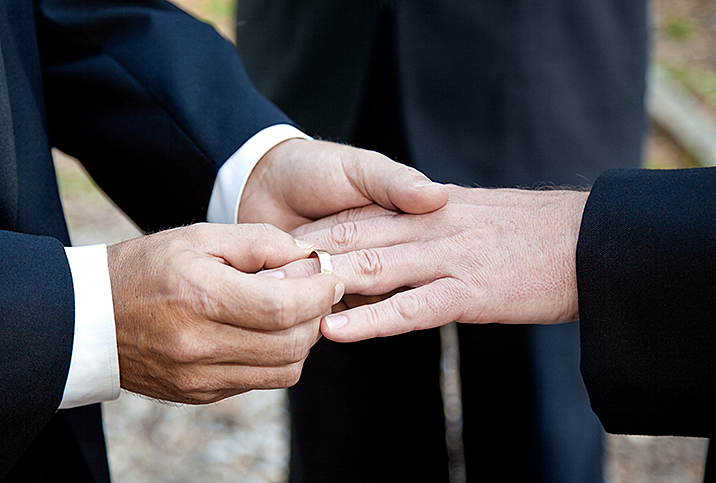Same-Sex Marriage Isn't Always Quite the Same

Ever since same-sex marriage became an available option to couples in the United States, we tend to talk about the issue as if it's a closed book—but there are some chapters of that book we've glossed over instead of reading closely.
No matter what the sex and gender makeup of a couple is, marriage as an institution has its flaws. However, there are few alternatives available when it comes to joining lives in an official, legal way.
Married vs. unmarried
"There's not a single statute that regulates the rights of unmarried couples," said Albertina Antognini, who teaches family law and related subjects at the University of Arizona in Tucson. "It's basically a state-by-state thing because family law is basically state-based. But it's also based on what different courts do. So, it's even hard to generalize within any state. But there are some generalities."
She said these generalities are easiest to observe in the context of property law, as it pertains to married versus unmarried couples.
"Same-sex couples actually, in some ways, do better than different-sex couples because, for a very long time, they were prevented from marrying," she said. "So, in this sense, courts were actually more willing to recognize property distribution [for same-sex couples]."
Because courts are simply more practiced at managing the logistics of lifestyle separation among unmarried same-sex couples than they are with intervening upon unmarried heterosexual couples, it's often the case that unmarried same-sex couples are able to receive comparable treatment to married couples from courts when it comes to wealth and property assignment.
'There's also a number of ways that same-sex couples still deal with discrimination in terms of how they are recognized as parents, employment laws and all these other laws that might treat them differently.'
The absence of protections for unmarried couples, in general, is a repeating theme for Antognini. In some ways, the fight for marriage equality on behalf of the LGBTQIA+ community has been one of few avenues for presenting sanctioned alternatives to marriage.
"Some jurisdictions tried to change this," Antognini said. "Basically, in the shadow of efforts to get same-sex couples access to marriage, the legislature started passing things like civil unions or domestic partnerships. It was a big deal that you had rights that were similar to marriage without it being marriage."
She said interest in viable marriage alternatives has waned since same-sex couples were granted federal access to marriage and the rights therein. Except in unique and specific cases, marriage meets the litigation needs of most couples looking to combine assets and domestic status.
But how secure is the Supreme Court decision that granted equal access to marriage under the law? And is there a downside to marriage access when you consider the overall absence of alternatives?
Courts, judges and others
Some people track the Supreme Court and make predictions as if projecting the results of sporting events. Antognini doesn't claim to be one of those people, but she did admit to having suspicions that marriage access isn't as ironclad for same-sex couples as you might think.
"I will say that there are a number of individuals on the court who have dissented in every case addressing the rights of same-sex couples," Antognini said. "So, I do think there is reason to question how stable of a right it is."
She also said it is important to recognize that access to marriage doesn't necessarily mean equal access to all aspects of marriage.
"Same-sex couples, for instance, may not have equal access to services surrounding weddings. They might not be able to enter into a store and request a cake, because the Supreme Court has said that religious liberty is also a constitutional value. So you might see the sort of trappings of marriage—all of the many benefits that are supposed to be associated with marriage—they might cut away at.
"There are different ways to chip away at that right, short of overruling Obergefell. Maybe you allow individuals to deny services to couples who are the same sex," Antognini said.
Location and lifestyles
States can have laws within their own jurisdictions that undermine and subvert federal laws protecting the rights of same-sex couples. For instance, Antognini said, "Some states were trying to prevent a parent in a same-sex relationship—the spouse of someone who gave birth—from appearing on a birth certificate."
She referred to Pavan v. Smith, a case in Arkansas in December 2017, which highlights the ways in which certain parties can circumnavigate or outright contradict federal laws protecting LGBTQIA+ people. Courts and various government departments across the country find all kinds of ways to apply exceptions to married same-sex couples where they do not and would not for heteronormatively married couples.
"The court basically said that is unconstitutional," Antognini said. "If you are giving these benefits to a different-sex married couple, you cannot deny them to a married same-sex couple. It's this idea of equality."
However, the court ruling did not eliminate difficulties for same-sex couples. For instance, Antognini added, same-sex couples also experience varying degrees of challenges to the process of becoming parents through adoption and foster systems.
"Even the marriage might still be something that's challenged, but there's also a number of ways that same-sex couples still deal with discrimination in terms of how they are recognized as parents, employment laws and all these other laws that might treat them differently," she said.
Divorce is still divorce
All domestic pairings have the potential to end in separation, and this process generally entails a divorce. Negar Katirai is a professor of law and director of the Domestic Violence Law Clinic at the University of Arizona in Tucson. She said that those who hire attorneys for divorce should plan on spending a pretty penny.
"The average is $15,000—that's what people spend. And that's just attorney's fees," she said.
Same-sex couples may not be immune to the emotional or financial cost of separation and divorce, but they are also not immune to the general advice given by Katirai and other legal professionals across the board: If you can separate and divorce amicably without involving too many other parties, it's worth it.
Besides the cost, having too many "cooks in the kitchen" when it comes to divorce lawyers and courts can complicate divorce proceedings unnecessarily regardless of the gender of those involved.
"If you do get an attorney, it's quite expensive," Katirai said. "All of the things you have to file, all of the time the attorney has to spend preparing for court and then being in court, waiting for the court to start."
It's worth noting the same biases and inequities mentioned above that affect married same-sex couples can also affect divorcing same-sex couples. While these examples are going to vary wildly from county to county, it's almost undeniable they will pop up one way or another.
Marriage provides a unique option for people who wish to combine lives in a formal and state-recognized way, and at this point in time, sexuality doesn't have to play a part in whether or not people have access to marriage.
But will this last and can the realities of same-sex marriage improve? We hope so.

















